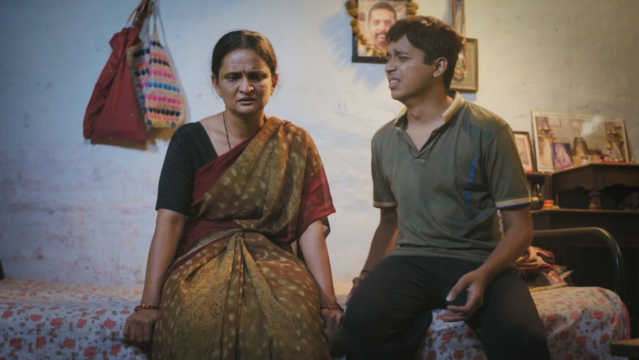
Keyur Seta
Mumbai, 18 Oct 2018 21:20 IST
The only silver lining is the presence of fine actors like Ashok Saraf, Vikram Gokhale, Dilip Prabhavalkar, Satish Alekar and Shivaji Satam.

Shivaji Park is a huge and famous maidan in the central Mumbai locality of Dadar and the title of Mahesh Waman Manjrekar’s film suggests the location would play some role in the story. The makers also promoted the film on social media by listing those who have achieved fame at Shivaji Park, like the late Shiv Sena founder Bal Thackeray and the India cricket star Sachin Tendulkar.
However, Shivaji Park has nothing to do with Me Shivaji Park beyond being the setting for the story, a place where the main characters meet for their morning walk and gossip session.
The film revolves around five ageing friends, Vikram Rajadhyaksha (Vikram Gokhale), Digambar Sawant (Ashok Saraf), Dilip Pradhan (Dilip Prabhavalkar), Satish Joshi (Satish Alekar) and Rustam Mestry (Shivaji Satam). Their pastime is to discuss the sorry state of the country and feel helpless at being unable to do anything about it.
One day, Joshi’s granddaughter Aishwarya falls mysteriously from her balcony and dies. Joshi and the girl’s parents are shattered. Soon, they also get frustrated to see justice proving to be elusive.
This is when Sawant, a retired police inspector, decides to execute a risky secret plan with Rajadhyaksha, Joshi and Mestry to avenge Aishwarya. They keep Pradhan out as he is a Gandhian who would never agree to their ways.
The chemistry among the five characters is the most impressive aspect of Me Shivaji Park. The characters are well etched out and their conversations are quite natural. They seem to be like any other senior citizens you may have come across who discuss, debate and argue about current affairs during their morning excursions.
The film's trailers suggested that Me Shivaji Park would be a sensible drama. The film is more like a masala entertainer revolving around the theme of revenge. This, however, is not a problem. What hurts the film more is the absence of logic at almost every turn.
Aishwarya's death and the events following the revenge plan are riddled with loopholes. We never find out exactly how Aishwarya fell to her death. Then, to enter the big bungalow of a powerful person, all you need is some chloroform, it seems, to make his staff unconscious one after the other. And it is weird to see people leaving evidence behind almost on purpose after committing a crime.
There is an important sequence where a man who has taken on a fictitious name, Borgaonkar, fools another person on the phone by claiming to be an Indian living in Israel. In between he speaks in Gujarati. Yet the person on the phone does not find anything fishy.
There are also geographical and period flaws. One character is shown using a smartphone 14 years ago. And we are told that Alibaug is ‘close’ to Goa when it is actually more than 500 kilometres away and closer to Mumbai (110km). A long list of such boo-boos could easily be compiled, but that would amount to giving out spoilers.
After the interval, the writers suddenly bring on another track. The transformation is anything but smooth and the message at the end leaves you confused.
Me Shivaji Park has similarities with Manjrekar’s own Viruddh (Hindi, 2005), which he later remade in Marathi as Kokanastha (2013), and the Ramesh Deo-starrer Jetaa (2010).
Two songs — one a dance number, the other a fun track featuring the five friends — appear unnecessary, the second one more so. Of the technical departments, the background score stands out for its totally unnecessary use of ear-splitting sounds to add 'thrill'. On one occasion, the music even overlaps the dialogues.
The presence and performances of the five veterans, however, prevent you from giving up entirely on the film. Prabhavalkar is convincing as the die-hard Gandhian who follows the Mahatma's principles even today. So is Gokhale as a retired judge. Saraf switches quite smoothly between comical and serious, except on some occasions where he appears awkward. Satam is believable as a traditional Parsi gentleman. Alekar also makes his presence felt.
Pravin Tarade plays the younger version of Saraf's character. To make him look convincing, Saraf has dubbed for him, which actually cracks you up. Uday Tikekar, Sharad Ponkshe and Santosh Juvekar are all right. Their characters are tripped by the content, just like the viewers.
You might also like

Review Marathi
Samaira review: This well-intentioned travel drama suffers from a dull script
Actor Rishi Deshpande's directorial debut doesn't rise as much as its performances. ...

Review Marathi
Goshta Arjunchi review: Triggering conversations about mental health
Anupam Barve’s short film urges people to talk to their families about what they are going...

Review Marathi
Ekda Kaay Zala review: Sumeet Raghvan impresses in a film that does not use its full potential
Directed by Dr Saleel Kulkarni, the film has a fine act by child artiste Arjun Purnapatre....

